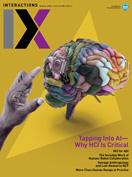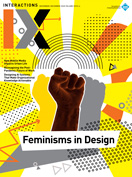Authors:
Daniela Rosner, Alex Taylor, Mikael Wiberg
This issue's theme comes out of a shared interest in feminist critiques and positionings across HCI. As an editorial team, each of us has extended our own practices by engaging with feminist scholars and the conversations they provoke for design. Through feminisms (there are so many), our attention has been drawn to the gendered inequities that suffuse technology's proliferation. But the design field has also examined wider and intersecting hierarchies of difference and made sense of technology's role within them, as regular Interactions contributors remind us (see Yolanda Rankin and Jakita Thomas's article "Intersectionality in HCI: Lost in Translation" in our last issue). We see this engagement as part of an ongoing dialogue in our field that is not limited to descriptions of what has been, but rather looks toward actively shaping the futures that lie ahead.
This issue explores a number of these feminist threads via dialogic voices. Three author pairs think together on the many forms that feminism takes in design today. Designer Mayar El Bakry and analyst Anita Say Chan begin this journey with a conversation on protest as feminist design. They reveal its underlying queer intersectional potential for imagining more equitable futures today. HCI scholars Sai Shruthi Chivukula and Shaowen Bardzell follow this with a rumination on HCI futures and pasts. Chivukula offers a proposal for feminisms through design; Bardzell responds with a look into her HCI beginnings. Alex Ahmed and Lilly Irani complete our Dialogues with a discussion of what it means to inspire and organize collective action. They describe what feminist perspectives push them to see and account for in their research and everyday environments. Adding individual reflections, Neha Kumar and Maryam Mustafa extend our Dialogues with the multiple trajectories of feminist HCI.
Feminist lineages feel especially relevant amid the current period of unrest.
Other work in this issue complements and furthers our inquiry. From inclusive interfaces to depatriachising design labs, we hear about the range of design and equity work on which HCI depends. For example, Denise Wilkins and colleagues outline the potentials and tensions around ML for knowledge management. In After Veillance, Sareeta Amrute's new forum on the developing entanglements between sensors and the senses, Adam Willems interviews Reetika Khera about India's unique identity number, Aadhaar. Looking across the Latin-American context, Toni Granollers reviews a year of HCI webinars. Jaz Choi launches a new column with polyvocal perspectives on the "co-" of codesign. Additional contributions highlight connections between feminisms today and tomorrow.
As many of these contributions demonstrate, feminist lineages feel especially relevant amid the current period of unrest. Offering both critical awareness and hope, they provide a forum for imagining other worlds. They show us other ways of building that respond to the unevenness of privilege and power. We look forward to seeing where feminist traditions further evolve and establish themselves in design over the decades to come.
Daniela Rosner, Alex Taylor, Mikael Wiberg [email protected]
Copyright held by authors
The Digital Library is published by the Association for Computing Machinery. Copyright © 2020 ACM, Inc.








Post Comment
No Comments Found